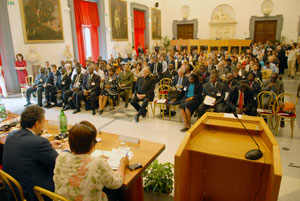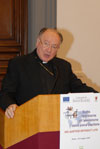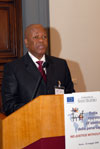 On May 25, in the Protomoteca Hall at the Campidoglio, the IV International Congress NO JUSTICE WITHOUT LIFE was held, promoted by the Community of Sant’Egidio on the issue: "From the moratorium to abolition of the capital punishment". On May 25, in the Protomoteca Hall at the Campidoglio, the IV International Congress NO JUSTICE WITHOUT LIFE was held, promoted by the Community of Sant’Egidio on the issue: "From the moratorium to abolition of the capital punishment".
23 countries have taken part in the initiative - both abolitionist and non abolitionist - of Africa, Asia, America, 28 political personalities – among which 13 ministers of Justice - Members of parliament, High Court Judges, attorneys.
Opening the congress, Mario Marazziti, speaker of the Community of Sant’Egidio, remembering the historical moment of the approval of the resolution on the moratorium of executions by the General Assembly of the United Nations on 18 December 2007, highlited the commitment of the Community as a place wher to let grow the relationship among abolitionist countries, and those countries that still use the capital punishment, but seek alternative ways.
 Cardinal Renato Raffaele Martino, president of the Pontifical Council for Justice and Peace, has spoken clearly: "A crime cannot be punished with another crime, with the death penalty. From the moratorium we must achieve full abolition. Many countries have to undertake this courageous step. This is why the Community of Sant’Egidio must be praised, encouraged and supported, because this campaign is in favour of life. Life is a gift from Godand it must be respected till its natural end. Euthanasia, abortion, death penalty are not a natural death. I thank whoever will fight for defending life”. Cardinal Renato Raffaele Martino, president of the Pontifical Council for Justice and Peace, has spoken clearly: "A crime cannot be punished with another crime, with the death penalty. From the moratorium we must achieve full abolition. Many countries have to undertake this courageous step. This is why the Community of Sant’Egidio must be praised, encouraged and supported, because this campaign is in favour of life. Life is a gift from Godand it must be respected till its natural end. Euthanasia, abortion, death penalty are not a natural death. I thank whoever will fight for defending life”.
 Nicola Mancino, Vice-President of the Consiglio Superiore della Magistratura, in his lecture, has confirmed the natural and historical role of Italy for abolition of the death penalty. "… Rome, capital city of Italy, has been several times in its history linked to the fight for abolition of the death penalty, which is a fight of civilization, of culture, and of justice too … In latest years the message against the death penalty started several times from Rome and from here reached out all parts of the world. The Coliseum is lightened up on every news that marks a step forward in this civil fight …" Furthermore, he remembered that the Community of Sant'Egidio is among the greater protagonists of the fight led by Italy for the moratorium of the capital punishment, of the engagement for peace and reconciliation in the world, and also of the struggle against AIDS. "The further step to finish - he added - after the moratorium, is that of full abolition…" Nicola Mancino, Vice-President of the Consiglio Superiore della Magistratura, in his lecture, has confirmed the natural and historical role of Italy for abolition of the death penalty. "… Rome, capital city of Italy, has been several times in its history linked to the fight for abolition of the death penalty, which is a fight of civilization, of culture, and of justice too … In latest years the message against the death penalty started several times from Rome and from here reached out all parts of the world. The Coliseum is lightened up on every news that marks a step forward in this civil fight …" Furthermore, he remembered that the Community of Sant'Egidio is among the greater protagonists of the fight led by Italy for the moratorium of the capital punishment, of the engagement for peace and reconciliation in the world, and also of the struggle against AIDS. "The further step to finish - he added - after the moratorium, is that of full abolition…"
Also  Jeff Radebe, Minister of Justice of South Africa, thanked the Community for its work against the capital punishment, focus point for dialogue among the nations. He also remembered that in his country the capital punishment has been abolished and that the right to life is a fundamental issue in the Constitution: "The most important things are reconciliation and social justice, imperative issues". Jeff Radebe, Minister of Justice of South Africa, thanked the Community for its work against the capital punishment, focus point for dialogue among the nations. He also remembered that in his country the capital punishment has been abolished and that the right to life is a fundamental issue in the Constitution: "The most important things are reconciliation and social justice, imperative issues".
 An echo to his words have been those of Enzo Scotti, Foreign Affairs Undersecretary. "This congress in Rome is another stage to let a new consciousness on the subject of capital punishment grow" he affirmed, confirming the commitment of Italy and asking the Community to continue pursuing its engagement. An echo to his words have been those of Enzo Scotti, Foreign Affairs Undersecretary. "This congress in Rome is another stage to let a new consciousness on the subject of capital punishment grow" he affirmed, confirming the commitment of Italy and asking the Community to continue pursuing its engagement.
 Marco Impagliazzo, President of the Community of Sant'Egidio, affirmed that "this meeting shows that the abolition of the capital punishment represents a new moral standard that will be more difficult to be unaware of at the international level. It is possible to imagine that the current trend – confirmed also by the votation of 2008 – will progressively make it become an overall recognized human right. He also remembered that the State and its institutes exist for the protection of life of the citizens and not for their death. "This is why we say that there is no justice without life. These meetings encouraged a lot of countries to undertake the necessary passages to pass from the state of mantainers to that of abolitionists, either De facto or absolutely De iure like Rwanda and Gabon in 2007, Burundi this year and soon Togo. What we ask to the politicians of every country is to work to let the human and moral authoritativeness of the law and of the society in which we live grow." Marco Impagliazzo, President of the Community of Sant'Egidio, affirmed that "this meeting shows that the abolition of the capital punishment represents a new moral standard that will be more difficult to be unaware of at the international level. It is possible to imagine that the current trend – confirmed also by the votation of 2008 – will progressively make it become an overall recognized human right. He also remembered that the State and its institutes exist for the protection of life of the citizens and not for their death. "This is why we say that there is no justice without life. These meetings encouraged a lot of countries to undertake the necessary passages to pass from the state of mantainers to that of abolitionists, either De facto or absolutely De iure like Rwanda and Gabon in 2007, Burundi this year and soon Togo. What we ask to the politicians of every country is to work to let the human and moral authoritativeness of the law and of the society in which we live grow."
 Ismail Herradura, Head of the Parole and Probation Office of the Philippines, confirming that the capital punishment is not a deterrent affirmed that it is often inflicted to the poorest, who have no legal assistance that defends them. Ismail Herradura, Head of the Parole and Probation Office of the Philippines, confirming that the capital punishment is not a deterrent affirmed that it is often inflicted to the poorest, who have no legal assistance that defends them.
"The protection of life for the government of the Philippines is a sacred engagement - said - and we will always enforce it."
 Tolekan Ismailova, President of the Association for Human Rights (Kyrgyzstan), reported the inhuman conditions of the prisons in her country, of the prisoners compelled to be in cells of 2 meters by 2 which have not even access to medical treatment. She thanked the Community of Sant'Egidio and Tamara Chikounova, President of the Associations "Mothers against the capital punishment" (Uzbekistan), for the work for humanization of the public opinion and for the abolition of the capital punishment. Tolekan Ismailova, President of the Association for Human Rights (Kyrgyzstan), reported the inhuman conditions of the prisons in her country, of the prisoners compelled to be in cells of 2 meters by 2 which have not even access to medical treatment. She thanked the Community of Sant'Egidio and Tamara Chikounova, President of the Associations "Mothers against the capital punishment" (Uzbekistan), for the work for humanization of the public opinion and for the abolition of the capital punishment.
 Viviana Martìn Salazar, Minister of Justice of the Costa Rica, underlined that in its country the capital punishment was abolished already in 1882. "The Costa Rica is a country of peace. The capital punishment does not allow to create new opportunities, we have the duty of rehabilitate who is captured and to believe in life. Today in our country 80% of the prisoners study and work" Viviana Martìn Salazar, Minister of Justice of the Costa Rica, underlined that in its country the capital punishment was abolished already in 1882. "The Costa Rica is a country of peace. The capital punishment does not allow to create new opportunities, we have the duty of rehabilitate who is captured and to believe in life. Today in our country 80% of the prisoners study and work"
 Jean Bosco Ndikumana, Minister of Justice of the Burundi, thanked the Community of Sant'Egidio for the privileged connection that it has with his country, reminding its commitment for the peace talks for reconciliation between Burundi and Rwanda. "Today Burundi found peace, now we rebuild the country. Burundi benefited in these years of the support of Sant'Egidio for the abolition of the capital punishment November 24, 2008. In this sense the Community was a sign of peace, of future and of hope." Jean Bosco Ndikumana, Minister of Justice of the Burundi, thanked the Community of Sant'Egidio for the privileged connection that it has with his country, reminding its commitment for the peace talks for reconciliation between Burundi and Rwanda. "Today Burundi found peace, now we rebuild the country. Burundi benefited in these years of the support of Sant'Egidio for the abolition of the capital punishment November 24, 2008. In this sense the Community was a sign of peace, of future and of hope."

Kobou Biossey Tozoun, Minister of Justice of Togo, expressed his happiness in announcing that soon the capital punishment country will be abolished in his country, thanks also to the bonds of friendship that tie Togo to the Community of Sant'Egidio.
 Kpakile Felemou, Community of Sant' Egidio, redrawed the story of the Community, asking himself the reason why we fight against the capital punishment. "It's because of our listening to the Word of God that we defend the poor without exceptions. We visit thousands of prisoners, and we could free several hundreds of them. There is a common destiny between Europe and Africa. The Community won racism, tribalism, separation, humanizing the life, against every violence. There is need of educating and making the persons aware of the sense of the State and of justice". Kpakile Felemou, Community of Sant' Egidio, redrawed the story of the Community, asking himself the reason why we fight against the capital punishment. "It's because of our listening to the Word of God that we defend the poor without exceptions. We visit thousands of prisoners, and we could free several hundreds of them. There is a common destiny between Europe and Africa. The Community won racism, tribalism, separation, humanizing the life, against every violence. There is need of educating and making the persons aware of the sense of the State and of justice".

Also Chilembo Todt Steward, Deputy Minister of the Justice of the Zambia, thanked the Community of Sant' Egidio for the global effort for abolition of the capital punishment, and for the work in Africa with the AIDS patients, with the DREAM programme.
 Yeon-Shik Pyon, President of the Catholic Commission for Human Rights (South Korea), remembered that her country is De facto abolitionist and that there is need of help from everyone to tell that abolition of the capital punishment is a central subject today, and is a world tendency. "We would like to become a model for Far East affirming the human rights in all of Asia" Yeon-Shik Pyon, President of the Catholic Commission for Human Rights (South Korea), remembered that her country is De facto abolitionist and that there is need of help from everyone to tell that abolition of the capital punishment is a central subject today, and is a world tendency. "We would like to become a model for Far East affirming the human rights in all of Asia"
 Concluding the meeting, Mario Marazziti said that the New Mexico shows that another way is possible. "Today there is a new moral standard fixed by the United Nations. There is a new wave of culture of life. Today the world feels the capital punishment, like slavery in past, as a crime. The persons can change, the justice must not be retributive, law is born in the human society to defend life and not to take it away. We heard encouraging experiences (Costa Rica, Canada). We need to build our societies in an intelligent manner on the base of the culture of the life. And' been drawn a new route: that of the justice riabilitativa. It waits us a large work, the capital punishment is not prevention of the crime, is not legitimate defence of the society. We should work all together to strengthen our culture and take courageous steps. It is time now to renounce to what seems a revenge of the State and does not cure the families of the victims." Concluding the meeting, Mario Marazziti said that the New Mexico shows that another way is possible. "Today there is a new moral standard fixed by the United Nations. There is a new wave of culture of life. Today the world feels the capital punishment, like slavery in past, as a crime. The persons can change, the justice must not be retributive, law is born in the human society to defend life and not to take it away. We heard encouraging experiences (Costa Rica, Canada). We need to build our societies in an intelligent manner on the base of the culture of the life. And' been drawn a new route: that of the justice riabilitativa. It waits us a large work, the capital punishment is not prevention of the crime, is not legitimate defence of the society. We should work all together to strengthen our culture and take courageous steps. It is time now to renounce to what seems a revenge of the State and does not cure the families of the victims."
|

